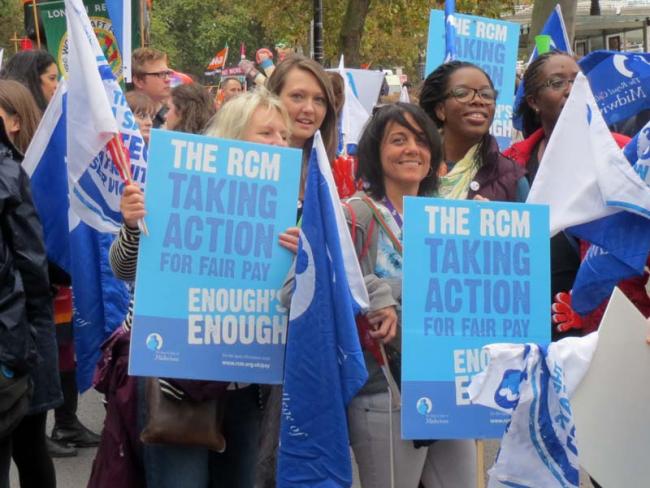
Midwives on the TUC march, five days after their first-ever strike. Photo Workers.
On Monday 13 October the Royal College of Midwives (RCM) struck for the first time in its long history – a four-hour stoppage between 7 am and 11 am that coincided with action by workers in nursing and paramedical services. Emergency cover was provided for women in labour but routine antenatal clinics were cancelled.
This action followed a ballot with a turnout of 49.4 per cent in which 82.2 per cent of members voted yes to striking. An even higher 94.6 per cent voted for action short of a strike. Midwives all across England mounted impressive pickets, and on many of these they were joined by mothers carrying their babies. Many messages of support came into the RCM headquarters and to individual picket lines, with the public showing good insight into the current pressures facing the profession. The link between midwifery pay, staffing levels and safety of mothers and babies was well understood.
Further action started on Tuesday 14 October to highlight the shortage of midwives in England and how much the service relies on the goodwill of midwives doing unpaid overtime. The RCM stresses that members will only work paid overtime and is asking midwives to keep a timesheet of all paid overtime to show the extent of the current shortage.
The employer cannot claim “partial performance” as has been done in disputes involving university staff. The action simply asks the employer to pay the midwives for work over their contracted hours.
• On Friday 17 October NICE, the National Institute for Health and Care Excellence, published new recommendations for consultation that give advice on how hospitals should make the right staffing decisions for women and their babies. The irony of this has not been lost on the RCM.
Union head of policy Sean O’Sullivan said: “Our assessment is that 3,200 more midwives are needed in England to ensure that all women receive care that is both safe and of good quality. It is our hope that the guidance that emerges following this consultation will make a significant contribution to the elimination of this shortage, once and for all.”
But that would require a significantly expanded number of midwives in training. And even if the funding for that could be agreed, finding sufficient experienced midwifery teachers would be a challenge. The RCM action against unpaid overtime is a vital first step in ensuring there is a true assessment of the staffing need.
• See companion articles: NHS strike: News from hospitals, Ambulance workers’ power blunts emergency provocation, Midwife anger over private ads
